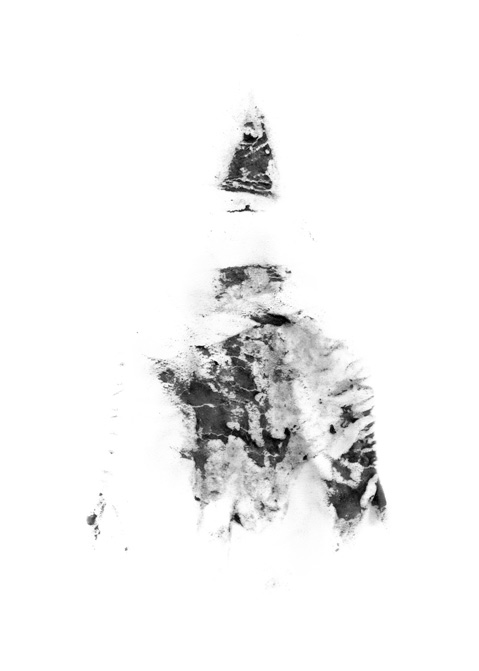Fresh Photos Take On Abstraction
Wit and Beauty Meet in Hard-to-Place Images
The pair of artists on view in Non-Representational take the notion of abstraction in photography and bend, twist, spin, fold, and mutilate it until there’s nothing left but a gorgeous abstract print on sensuous, fine-grade paper and an unexpected, sometimes shocking story about how those lovely marks got there. In this provocative show, even non-representational art turns out to be hiding a juicy narrative.
Kim Kauffman lives and works in Lansing, Michigan, where she has put in more than 35 years of painstaking work as a commercial and fine-art photographer. Kauffman has always explored alternative processes, even before switching in 1999 to the particular method of digitally based camera-less photo collage technique seen in this series, which she calls “Illumitones.” Inspired in part by the painter Paul Cézanne, Kauffman takes blank sheets of paper and then creases or stands them on end on the bed of a scanner. These ghostly images of arcs, lines, folds, and shadows are then collaged together digitally in such a way as to engage the viewer in a visual puzzle or riddle. Kauffman’s subtly woven organic and geometric shapes shift and coalesce over time as they worm their way into one’s consciousness. Take an image like “Improvisation,” which uses the soaring arcs of curved poster boards seen on edge to bound the space in which a handful of crisp folded blank sheets of paper play a game of “who’s on top?” It’s a lyrical exploration of constructivist geometry, but one achieved through the medium of office supplies. Across the room is another wall of Kauffman’s Reductions, an earlier series also completed with the help of a scanner, but this time with the lid closed, achieving a radically different effect — the blinding white opposite of the shadow world into which the figures in “Illumitones” seem to be tending. It’s all elegance, power, and indirection, an outstanding and unusual trio of effects to be found together, and so persistently.

For Victoria Mara Heilweil, the aching void of an unmarked brilliant-white sheet of expensive paper also speaks, but rather than saying, “Reimagine me,” it would seem to be saying, “Leave your best mark — I can take it.” In the series of images known as Remnant, Heilweil has chosen the stark simplicity of deep-black marks against a white background to express her fascination with wabi-sabi, a Japanese aesthetic principle that insists that true beauty inheres in the imperfect and impermanent, the incomplete and the unconventional. As a new mother, Heilweil sought a way to document her experiences with her child as an infant that would fulfill her mission as an artist. To this end, she has used a scanner to record the impressions made by soiled diapers, and a digital editing program to create images based on those scat scans. Each day of her child’s life is thus documented both by the black-and-white image trace of the scanned diaper and by the data included in the title — the child’s age at the time recorded in months and days. It’s a taboo subject, for sure. Not many people head out to the gallery knowing they want to see soiled diapers. But, through the extreme care with which she has fashioned these enigmatic images, something that can also be seen in the accompanying video of Heilweil folding clean diapers fresh from the laundry, a wholly new form of beauty has been born.



